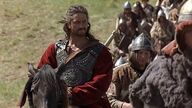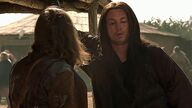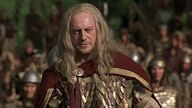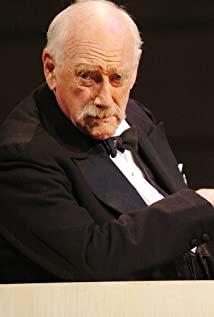The handsome Gerard Butler who played Attila in "Xiongnu King Attila" is a handsome British actor who used to play in "The Phantom of the Opera " and "There have been wonderful performances in ".
The decisive rise of the Xiongnu power was after Attila (Attila, 406-453) became king of the Xiongnu Empire .
In 433 AD, 27-year-old Attila and his brother Bleda inherited the throne of the empire from their uncle Roas.
In 436, Attila mercilessly murdered his brother and ruled the empire alone. Compared with his predecessors, Attila is more ambitious, more aggressive, and extremely talented. In history, Attila is an extremely prominent role. The Xiongnu empire in the Attila period is the last chapter in the history of Xiongnu, and it is also the most glorious chapter. He humiliated the Ancient Rome people, discouraged the Germans, and possessed such a powerful force that frustrated and helpless Westerners, so much so that he and his Xiongnu cavalry were called " Attila " (Scourge of God).
Regarding various aspects of Attila's own records, there have been some derogations in Western history books, but they still have vivid and concrete descriptions.
When Attila was young, he fought fiercely. After he became king, he relied more on his mind than his martial arts to complete the conquest of the north. He showed great ambition, superb political and diplomatic skills, and he was cunning and cruel. As the king of Xiongnu, Attila, his gait and behavior show a kind of arrogance and arrogance whose power can arrogantly surpass all mankind.
According to legend, he once claimed to have the sword of the god of war, so when his subordinates met him, if they looked directly at him, they had to step back at the same time, otherwise they would burn their eyes. He has a habit of rolling his eyes fiercely, as if he enjoys appreciating the fear of those who are frightened by him.
Attila advocates simplicity in life, but can tolerate the extravagance of his subordinates. His subjects were very afraid of him. When he went out to inspect, they would cheer at him to show their awe.
In Western historical legends, Attila is extremely cruel and vicious, specializing in the evil deeds that plunder the city; and the extreme evil is concentrated on his body, and the baby will die if he sees it. Attila's appearance seemed unflattering. According to records, he was short and fat, with wide shoulders, a huge head on his stubby neck, thick black hair and a sparse beard, a flat nose, and a pair of dark eyes with sharp and yawning birds. Although this description seems to be a little unrespectful, there is no doubt that it must be an image of an Oriental. This shows that after more than three hundred years of westward migration, the Xiongnu people have not lost their original physical characteristics by being mixed by other ethnic groups.
We don't know much about the social life of the Xiongnu people in the Attila era, but we can still see scales from some legends and stories. There was once an Eastern Ancient Rome official and his entourage to the Xiongnu Empire. They had the honor to meet Attila and other Xiongnu generals, and even participated in a feast held by Attila. From his long-winded record of this experience, we can learn a lot of folklore, diplomacy, and politics at the time.











